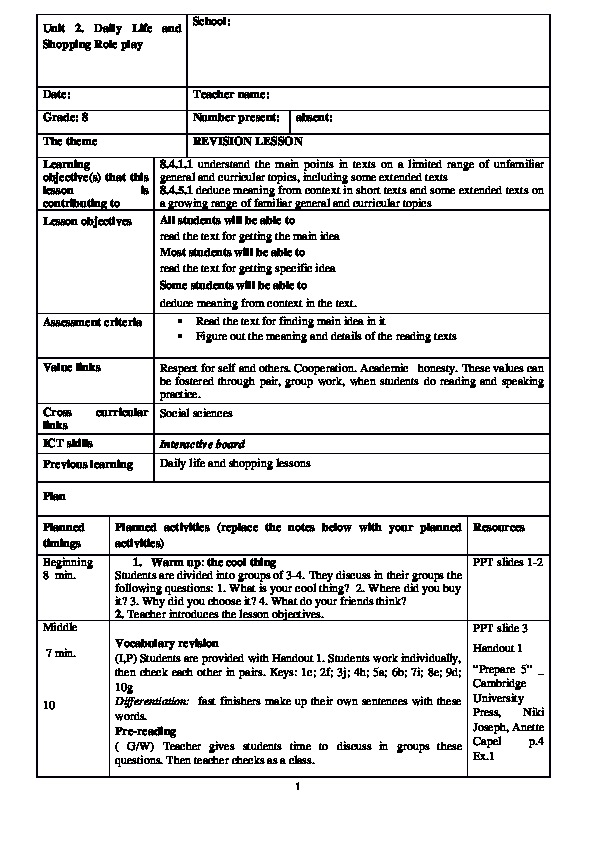Урок английского языка на тему Daily Life and Shopping Role play
Разработки курсов
docx
английский язык
8 кл
07.11.2018

Daily Life and Shopping Role play
8.4.1.1 understand the main points in texts on a limited range of unfamiliar general and curricular topics, including some extended texts
8.4.5.1 deduce meaning from context in short texts and some extended texts on a growing range of familiar general and curricular topics8.4.1.1 understand the main points in texts on a limited range of unfamiliar general and curricular topics, including some extended texts
8.4.5.1 deduce meaning from context in short texts and some extended texts on a growing range of familiar general and curricular topics
English_Grade_8_Unit 2_Daily_Life_and_Shopping_Revision_ Lesson Plan_version 2 (1).docx
Unit 2.
Shopping Role play
Daily Life and
School:
Date:
Grade: 8
The theme
Learning
objective(s) that this
lesson
is
contributing to
Lesson objectives
Teacher name:
Number present:
absent:
REVISION LESSON
8.4.1.1 understand the main points in texts on a limited range of unfamiliar
general and curricular topics, including some extended texts
8.4.5.1 deduce meaning from context in short texts and some extended texts on
a growing range of familiar general and curricular topics
All students will be able to
read the text for getting the main idea
Most students will be able to
read the text for getting specific idea
Some students will be able to
deduce meaning from context in the text.
Assessment criteria
Read the text for finding main idea in it
Figure out the meaning and details of the reading texts
Value links
curricular
Cross
links
ICT skills
Previous learning
Respect for self and others. Cooperation. Academic honesty. These values can
be fostered through pair, group work, when students do reading and speaking
practice.
Social sciences
Interactive board
Daily life and shopping lessons
Plan
Planned
timings
Beginning
8 min.
Middle
7 min.
10
Planned activities (replace the notes below with your planned
activities)
Resources
1. Warm up: the cool thing
Students are divided into groups of 34. They discuss in their groups the
following questions: 1. What is your cool thing? 2. Where did you buy
it? 3. Why did you choose it? 4. What do your friends think?
2. Teacher introduces the lesson objectives.
Vocabulary revision
(I,P) Students are provided with Handout 1. Students work individually,
then check each other in pairs. Keys: 1c; 2f; 3j; 4h; 5a; 6b; 7i; 8e; 9d;
10g
Differentiation: fast finishers make up their own sentences with these
words.
Prereading
( G/W) Teacher gives students time to discuss in groups these
questions. Then teacher checks as a class.
PPT slides 12
PPT slide 3
Handout 1
“Prepare 5” _
Cambridge
University
Press,
Niki
Joseph, Anette
Capel
p.4
Ex.1
1 15 min
End
10 min
Do you like shopping for new clothes?
Do you often buy new clothes? Do you think that the clothes we wear
reflect what is inside us? Did you wear a school uniform?
Do you think wearing uniforms is a good idea? Do you think there's a
difference between" fashion " and "style" ?
Teacher monitors and gives positive feedback for interesting
suggestions. Teacher asks a spokesperson from each group to give a
reason, and write key words on the board. Differentiation: Teacher
monitors and supports struggling students by providing appropriate
grammar structures and vocabulary units. Teacher gives feedback to
each students.
Reading
Students are provided with Handout 2. Students individually read the
text and do the tasks.
Assessment: formative assessment Handout 3. Teacher introduces
students with assessment criteria before starting reading activity.
Students are able to check themselves conduct peer assessment using
criteria.
PLENARY
Come back to lessons objectives to understand what students have done
during the lesson.
Feedback:
Students reflect the lesson by answering the questions:
A human sequencing game is played! Teacher gives students a
statement relating to the topic and asks students to line up in order of
how strongly they agree/ disagree with the statement.
Homework: revise vocabulary
PPT slide4
Handout 2
Reading
Handout 3
PPTslide5
PPT
Slides 67 8
Additional information
Differentiation – how do
you plan to give more
support? How do you plan
to challenge the more able
learners?
•
Pair, Group Work:
Students collaborate in pairs
whose membership changes
as needed.
•
Differentiation by
individual support, taking
into account
individual
abilities of learners
•
Differentiation
enrichment and support
by
Assessment – how are you planning to check
learners’ learning?
Health and
safety check
• Monitor learners to check speaking activities.
• Record what they considered they had learned from
the lesson. Could they express what they had learned
about content and language? Could they express
which skills they had developed?
•
•
observation/monitoring and checking reading task.
Ongoing assessment
Formative assessment is held through
from
•Points
Safety
rules
were used at
this lesson.
•Breaks
physical
activities used.
and
2 Reflection
the
lesson
Were
objectives/learning
objectives realistic? Did all
learners achieve the LO?
If not, why?
Did
differentiation work well?
Did I stick to timings?
What changes did I make
from my plan and why?
planned
my
Summary evaluation
What two things went really well (consider both teaching and learning)?
What two things would have improved the lesson (consider both teaching and learning)?
What have I learned from this lesson about the class or achievements/difficulties of individuals
that will inform my next lesson?
3
Материалы на данной страницы взяты из открытых истончиков либо размещены пользователем в соответствии с договором-офертой сайта. Вы можете сообщить о нарушении.
07.11.2018
Посмотрите также:
© ООО «Знанио»
С вами с 2009 года.
![]()
О портале

